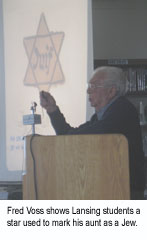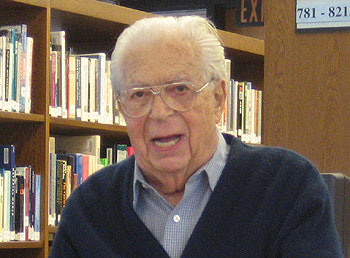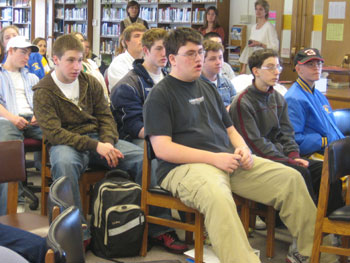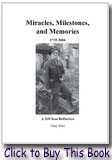- By Dan Veaner
- Around Town
 Print
Print
Imagine your middle school teacher making you stand at the front of the class while leading a song that exclaims that you and all people of your religion should be killed. You are regularly taunted and beat up. You are not allowed to enter your own house when returning there for your confirmation party. Your neighbors and teachers watch your church being torched, cheering when it goes into flames. Imagine that your government sanctions all these things, and chases you down with the intention of murdering you.
You say that couldn't happen in Lansing? Nobody imagined it could happen in Germany in the 1940s. But it did.

Lansing sophomores learn about the Holocaust from Fred Voss,
who lived through and survived the Nazi horrors when he was
even younger than the students are now.
 You have likely heard the famous George Santayana quote, "Those who cannot remember the past are condemned to repeat it." And Elie Wiesel said, "Remembering is a noble and necessary act. The call of memory, the call to memory, reaches us from the very dawn of history." So imagine what it must be like to have lived that horror, to have spent a lifetime talking about it so it would never happen again, and finding that since six million of your people were murdered including 67 members of your own family, another 96 million innocent people have been obliterated.
You have likely heard the famous George Santayana quote, "Those who cannot remember the past are condemned to repeat it." And Elie Wiesel said, "Remembering is a noble and necessary act. The call of memory, the call to memory, reaches us from the very dawn of history." So imagine what it must be like to have lived that horror, to have spent a lifetime talking about it so it would never happen again, and finding that since six million of your people were murdered including 67 members of your own family, another 96 million innocent people have been obliterated.
Last week was the 'Days of Rememberance,' established by the US Congress to commemorate victims of the Holocaust, with Holocaust Remembrance Day April 15. In tribute to that commemoration Fred Voss came to Lansing High School to share his experiences with the Sophomore class. Voss was younger than his audience when the Nazis ruled Germany and decided to implement the so-called 'Final Solution' to annihilate the Jewish people. "Let me beg you to stop hating people because they are different than you are," Voss told the students. "Learn from them, learn their culture, learn their history.
English Teacher June Martin, who invites Voss to speak to Lansing sophomores each year th this time says that Voss made a deep impression on her students. "My sophomores loved hearing his story about the Holocaust and his experiences," she says. "His message of tolerance and indifference to hate was very well received. He clearly is a gracious gentleman. The kids loved it."
Voss spoke in two sessions in the High School library, sharing his childhood experience with students and teachers. He speaks passionately and intimately, telling how it felt when the Nazis put a sign in his parent's shop window, telling customers not to buy there. He and his family returned home on the day of his Bar Mitzvah in 1933 to find the Nazis wouldn't allow them inside for a planned celebration. In 1935 Voss was beaten up by members of the Hitler Youth, his own classmates. His aunt was taken to a concentration camp and never heard from again because she forgot her coat one day, which had the yellow star marking her as a Jew sewn to it. His father was also taken to a concentration camp, though by some miracle he was later released.

These stories are powerful, all the more so because Voss actually lived them, because he was a school child like his audience when these things happened to him, and because he is a skillful, passionate speaker. When he describes what it was like on Krisallnacht, the 'night of broken glass' when the Nazis arrested 40,000 Jewish men including Voss's father and shipped them to concentration camps on cattle cars, you see these events through his eyes, and in some small way you imagine you are there.
This year Voss stressed the atrocities that are currently being committed in Darfur, a region of the Sudan, and the recent genocide in Rwanda. "Again the lives of millions of people are at risk as they are driven from their homes and from their villages," he says. Despite the difference in culture, Voss knows what they are going through. "When adults make war children suffer," he says.

Students and teachers take in Fred Voss's story. English teacher June Martin
(upper right, standing) hosts Voss for Lansing sophomores each year.
The students related to the personal aspect of Voss's story. He talks to them, not down to them. When he implores them not to hate it comes from the heart. It is not just another adult telling kids what to do. He showed a picture of his class of 40 children, taken at a Jewish parochial school in 1928, pointing out himself to his audience. "I was eight years old," he tells them. "Of the 40 children only seven survived the Holocaust.
One student asked him how he could possibly not hate the Germans after what they did to him, and he says there would be a lot of blind, toothless people if everyone practiced 'an eye for an eye, a tooth for a tooth.' And when asked by another student why he has never visited the sites of the concentration camps, he simply states, "I am really afraid if I would go to any concentration camps that I might step on the ashes of my family or (my wife's) family. I just cannot bring myself to go. I just can't do it."
 Voss has spent years speaking to students, including many colleges across the country. In 2002 he received an award from the National Campaign for Tolerance, presented by Rosa Parks. His book 'Miracles, Milestones, and Memories' is in its fourth edition, and he is scheduled to tell his story again on June 2 at Borders in the Pyramid Mall.
Voss has spent years speaking to students, including many colleges across the country. In 2002 he received an award from the National Campaign for Tolerance, presented by Rosa Parks. His book 'Miracles, Milestones, and Memories' is in its fourth edition, and he is scheduled to tell his story again on June 2 at Borders in the Pyramid Mall.
You can't help but be moved when Voss tells this story. Yet despite the horrors of his experience, he was one of the few lucky ones. He and his parents and grandmother managed to escape with their lives and little else. But they survived, going first to England, where he met his wife Ilse who had also escaped, and then to the United States. He joined the US Army after Pearl Harbor, and found himself back in Germany as a young American soldier. He and Ilse now live in Ithaca, and he is still active as a speaker.
Voss notes that these Lansing students are among the last to be exposed to actual Holocaust survivors, as the generation of children who survived have aged and will soon be gone. When that happens his hope is that this new generation will remember his story and pass it on. And that people will finally learn from history.
----
v3i16
You say that couldn't happen in Lansing? Nobody imagined it could happen in Germany in the 1940s. But it did.

Lansing sophomores learn about the Holocaust from Fred Voss,
who lived through and survived the Nazi horrors when he was
even younger than the students are now.
 You have likely heard the famous George Santayana quote, "Those who cannot remember the past are condemned to repeat it." And Elie Wiesel said, "Remembering is a noble and necessary act. The call of memory, the call to memory, reaches us from the very dawn of history." So imagine what it must be like to have lived that horror, to have spent a lifetime talking about it so it would never happen again, and finding that since six million of your people were murdered including 67 members of your own family, another 96 million innocent people have been obliterated.
You have likely heard the famous George Santayana quote, "Those who cannot remember the past are condemned to repeat it." And Elie Wiesel said, "Remembering is a noble and necessary act. The call of memory, the call to memory, reaches us from the very dawn of history." So imagine what it must be like to have lived that horror, to have spent a lifetime talking about it so it would never happen again, and finding that since six million of your people were murdered including 67 members of your own family, another 96 million innocent people have been obliterated.Last week was the 'Days of Rememberance,' established by the US Congress to commemorate victims of the Holocaust, with Holocaust Remembrance Day April 15. In tribute to that commemoration Fred Voss came to Lansing High School to share his experiences with the Sophomore class. Voss was younger than his audience when the Nazis ruled Germany and decided to implement the so-called 'Final Solution' to annihilate the Jewish people. "Let me beg you to stop hating people because they are different than you are," Voss told the students. "Learn from them, learn their culture, learn their history.
English Teacher June Martin, who invites Voss to speak to Lansing sophomores each year th this time says that Voss made a deep impression on her students. "My sophomores loved hearing his story about the Holocaust and his experiences," she says. "His message of tolerance and indifference to hate was very well received. He clearly is a gracious gentleman. The kids loved it."
Voss spoke in two sessions in the High School library, sharing his childhood experience with students and teachers. He speaks passionately and intimately, telling how it felt when the Nazis put a sign in his parent's shop window, telling customers not to buy there. He and his family returned home on the day of his Bar Mitzvah in 1933 to find the Nazis wouldn't allow them inside for a planned celebration. In 1935 Voss was beaten up by members of the Hitler Youth, his own classmates. His aunt was taken to a concentration camp and never heard from again because she forgot her coat one day, which had the yellow star marking her as a Jew sewn to it. His father was also taken to a concentration camp, though by some miracle he was later released.

These stories are powerful, all the more so because Voss actually lived them, because he was a school child like his audience when these things happened to him, and because he is a skillful, passionate speaker. When he describes what it was like on Krisallnacht, the 'night of broken glass' when the Nazis arrested 40,000 Jewish men including Voss's father and shipped them to concentration camps on cattle cars, you see these events through his eyes, and in some small way you imagine you are there.
This year Voss stressed the atrocities that are currently being committed in Darfur, a region of the Sudan, and the recent genocide in Rwanda. "Again the lives of millions of people are at risk as they are driven from their homes and from their villages," he says. Despite the difference in culture, Voss knows what they are going through. "When adults make war children suffer," he says.

Students and teachers take in Fred Voss's story. English teacher June Martin
(upper right, standing) hosts Voss for Lansing sophomores each year.
The students related to the personal aspect of Voss's story. He talks to them, not down to them. When he implores them not to hate it comes from the heart. It is not just another adult telling kids what to do. He showed a picture of his class of 40 children, taken at a Jewish parochial school in 1928, pointing out himself to his audience. "I was eight years old," he tells them. "Of the 40 children only seven survived the Holocaust.
One student asked him how he could possibly not hate the Germans after what they did to him, and he says there would be a lot of blind, toothless people if everyone practiced 'an eye for an eye, a tooth for a tooth.' And when asked by another student why he has never visited the sites of the concentration camps, he simply states, "I am really afraid if I would go to any concentration camps that I might step on the ashes of my family or (my wife's) family. I just cannot bring myself to go. I just can't do it."
 Voss has spent years speaking to students, including many colleges across the country. In 2002 he received an award from the National Campaign for Tolerance, presented by Rosa Parks. His book 'Miracles, Milestones, and Memories' is in its fourth edition, and he is scheduled to tell his story again on June 2 at Borders in the Pyramid Mall.
Voss has spent years speaking to students, including many colleges across the country. In 2002 he received an award from the National Campaign for Tolerance, presented by Rosa Parks. His book 'Miracles, Milestones, and Memories' is in its fourth edition, and he is scheduled to tell his story again on June 2 at Borders in the Pyramid Mall.You can't help but be moved when Voss tells this story. Yet despite the horrors of his experience, he was one of the few lucky ones. He and his parents and grandmother managed to escape with their lives and little else. But they survived, going first to England, where he met his wife Ilse who had also escaped, and then to the United States. He joined the US Army after Pearl Harbor, and found himself back in Germany as a young American soldier. He and Ilse now live in Ithaca, and he is still active as a speaker.
Voss notes that these Lansing students are among the last to be exposed to actual Holocaust survivors, as the generation of children who survived have aged and will soon be gone. When that happens his hope is that this new generation will remember his story and pass it on. And that people will finally learn from history.
----
v3i16



